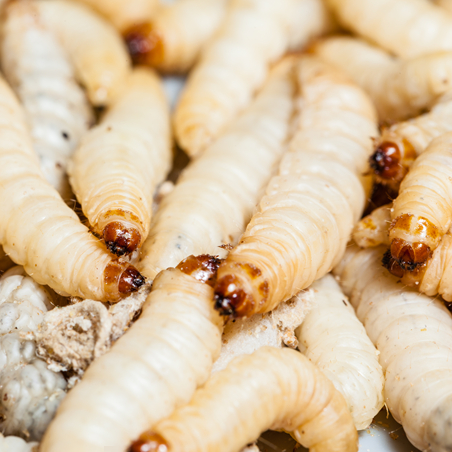
Maggot therapy
Alternate names: Biodebridement, Biosurgery, Biosurgical Debridement, Biosurgical Management, Biosurgical Wound Debridement, Biotherapy, Green Bottle Fly Larvae, Larva Therapy (LT), Larvae Therapy, Larval Debridement Therapy (LDT), Lucilia cuprina, Lucilia sericata, Maggot Debridement Therapy (MDT)
Actions: Antibacterial, Anti-inflammatory, Extracellular degradation, Neuroregeneration, Wound-healing
Background
Maggots are living fly larvae that eat decaying or dead tissue. Maggot therapy involves placing live maggots in a non-healing wound.
A non-healing wound is a wound that doesn't improve after four weeks or heal after eight weeks. Larvae of the green bottle fly (Lucilia sericata) are most often used in maggot therapy. By removing the dead tissue and bacteria on and around a wound, maggot therapy might help improve wound healing and prevent infection.
People use maggot therapy for foot sores related to diabetes, bed sores, leg sores caused by weak blood circulation, and many other conditions, but there is no good scientific evidence to support most of these uses.
Using non-sterile maggots in maggot therapy might lead to serious infections. Due to safety concerns, the US FDA started regulating maggot therapy in 2003. One specific brand of maggot therapy, Medical Maggots, is approved by the US FDA as a prescription product.
A non-healing wound is a wound that doesn't improve after four weeks or heal after eight weeks. Larvae of the green bottle fly (Lucilia sericata) are most often used in maggot therapy. By removing the dead tissue and bacteria on and around a wound, maggot therapy might help improve wound healing and prevent infection.
People use maggot therapy for foot sores related to diabetes, bed sores, leg sores caused by weak blood circulation, and many other conditions, but there is no good scientific evidence to support most of these uses.
Using non-sterile maggots in maggot therapy might lead to serious infections. Due to safety concerns, the US FDA started regulating maggot therapy in 2003. One specific brand of maggot therapy, Medical Maggots, is approved by the US FDA as a prescription product.
Safety Safety definitions
When applied to the skin: Maggot therapy is possibly safe when sterile maggots are used under the care of a qualified healthcare professional. It's usually well-tolerated, but side effects might include bleeding and pain.
Maggot therapy is possibly unsafe when non-sterile maggots are used. Maggots that have bacteria on them can cause a severe blood infection.
Bleeding disorders: Maggot therapy might increase bleeding in some people. It might make bleeding disorders worse. Use cautiously.
Maggot therapy is possibly unsafe when non-sterile maggots are used. Maggots that have bacteria on them can cause a severe blood infection.
Special Precautions & Warnings:
Pregnancy and breast-feeding: There isn't enough reliable information to know if maggot therapy is safe to use when pregnant or breast-feeding. Stay on the safe side and avoid use.Bleeding disorders: Maggot therapy might increase bleeding in some people. It might make bleeding disorders worse. Use cautiously.
Effectiveness
NatMed Pro rates effectiveness based on scientific evidence according to the following scale: Effective, Likely Effective, Possibly Effective, Possibly Ineffective, Likely Ineffective, Ineffective, and Insufficient Evidence to Rate.
Possibly effective Effectiveness definitions
- Foot sores in people with diabetes. Maggot therapy can help heal foot sores in people with diabetes.
- Leg sores caused by weak blood circulation (venous leg ulcer). Maggot therapy might help to remove the dead skin from leg sores, but it doesn't seem to help these sores heal faster than conventional treatments. It might also increase the risk for side effects.
Dosing & administration
Maggot therapy involves applying sterile maggots on to a wound and covering the wound with gauze and a dressing. The dressing is usually removed 1-4 days later when the maggots are fully grown, and then the wound is rinsed with a sterile saline. This may need to be repeated once or twice per week until the wound is completely cleaned.
One specific brand of maggot therapy, Medical Maggots, is approved by the US FDA via prescription. Using non-sterile maggots in maggot therapy might lead to serious infections. Speak with a healthcare provider before use.
One specific brand of maggot therapy, Medical Maggots, is approved by the US FDA via prescription. Using non-sterile maggots in maggot therapy might lead to serious infections. Speak with a healthcare provider before use.
Interactions with pharmaceuticals
Ivermectin (Stromectol, others)
Interaction Rating=Moderate Be cautious with this combination.
Ivermectin kills maggots. Using ivermectin during maggot therapy might decrease the effectiveness of maggot therapy.
Interactions with herbs & supplements
Fenugreek: Fenugreek oil might kill maggots. Applying fenugreek oil to the skin during maggot therapy might decrease the effectiveness of maggot therapy.
Radish: Radish oil might kill maggots. Applying radish oil to the skin during maggot therapy might decrease the effectiveness of maggot therapy.
Radish: Radish oil might kill maggots. Applying radish oil to the skin during maggot therapy might decrease the effectiveness of maggot therapy.
Interactions with foods
There are no known interactions with foods.
vital.ly has licensed monographs from TRC Healthcare.
This monograph was last reviewed on 12/09/2024 10:00:00 and last updated on 22/07/2015 21:29:56. Monographs are reviewed and/or updated multiple times per month and at least once per year.
Natural Medicines disclaims any responsibility related to medical consequences of using any medical product. Effort is made to ensure that the information contained in this monograph is accurate at the time it was published. Consumers and medical professionals who consult this monograph are cautioned that any medical or product related decision is the sole responsibility of the consumer and/or the health care professional. A legal License Agreement sets limitations on downloading, storing, or printing content from this Database. No reproduction of this monograph or any content from this Database is permitted without written permission from the publisher. It is unlawful to download, store, or distribute content from this site.




